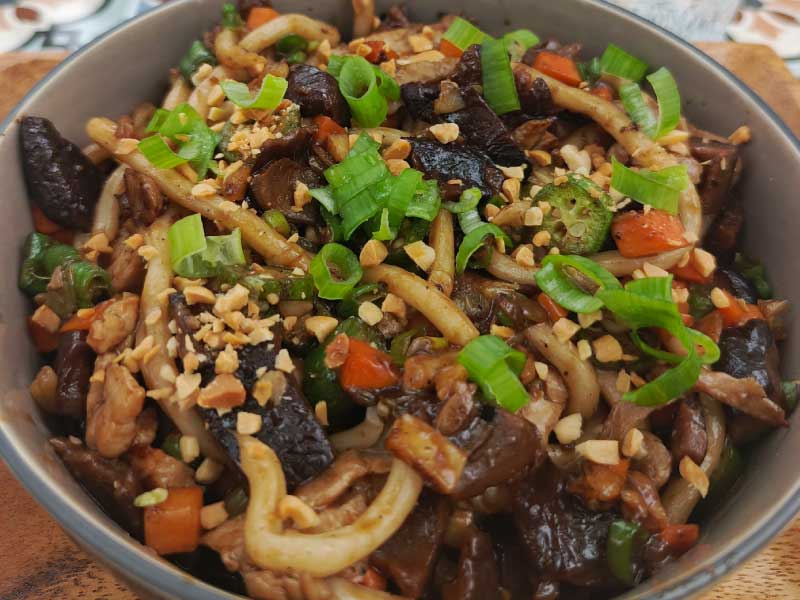A growing seleccion
Although animal protein has a strong presence in Filipino cuisine, it’s now common to find restaurants offering delicious vegan food in Coron. Every season, more and more vegan restaurants in Coron, include vegan options on their menus. We should highlight Verde Rekado and Alfresco Coron, two of the best restaurants in Coron.

Vegan Food in Coron and the Philippines: A Culinary Journey for International Travelers
Coron, a jewel of Palawan, highlights turquoise lagoons, dramatic limestone cliffs, and thrilling world-class diving spots. Beyond natural wonders, Coron welcomes travelers who seek plant-based cuisine and vibrant, adventurous culinary experiences. Vegan food in Coron celebrates Filipino culinary traditions, tropical abundance, and flavors inspired by neighboring Southeast Asian countries. International tourists enjoy nourishment and cultural immersion while discovering the evolving food landscape across the Philippines.
The Foundations of the Vegan Food in Coron
The Philippines is blessed with fertile soil, tropical climate, and rich biodiversity, making plant-based ingredients abundant and diverse. Staples such as rice, coconut, bananas, papaya, mango, taro, and root crops form the backbone of many traditional dishes. For vegans, this natural bounty translates into meals that are fresh, vibrant, and deeply connected to the land.
– Rice as the centerpiece: Every Filipino meal revolves around rice, often paired with vegetables, legumes, or tropical fruits.
– Coconut culture: Coconut milk and coconut oil are widely used, giving vegan dishes a creamy texture and rich flavor.
– Banana blossoms and jackfruit: These local ingredients are often used as meat substitutes, offering texture and versatility.
– Tropical fruits: Mangoes, pineapples, and papayas are not just desserts but also incorporated into savory dishes, salads, and sauces.
International Tourist Expectations
– Freshness above all: Ingredients are often sourced locally, harvested from nearby farms or islands.
– Simple yet flavorful dishes: Meals emphasize natural flavors, enhanced by spices, herbs, and coconut-based sauces.
– Fusion of cultures: Vegan food in Coron reflects not only Filipino traditions but also the culinary exchanges with other Southeast Asian countries.
– Adaptability: Many local cooks are accustomed to catering to international visitors, making plant-based adjustments to traditional recipes with ease.
Coron’s Vegan Scene in Context
– Island sustainability: Vegan meals often highlight eco-conscious practices, using minimal packaging and emphasizing fresh produce.
– Community-driven cooking: Food preparation is often communal, reflecting Filipino hospitality and the importance of sharing meals.
– Tourism influence: The influx of international visitors has encouraged local cooks to experiment with vegan-friendly adaptations of traditional dishes, blending authenticity with accessibility.
Southeast Asian Influences
– Thai inspiration: The use of lemongrass, chili, and lime in vegan dishes reflects Thai culinary influence, adding zest and complexity.
– Vietnamese freshness: Fresh herbs, rice noodles, and light broths echo Vietnamese vegan cuisine, emphasizing balance and health.
– Indonesian richness: Peanut-based sauces and tempeh, staples in Indonesia, occasionally appear in Coron’s vegan adaptations.
– Malaysian spices: Curry blends and aromatic spices from Malaysia contribute depth to plant-based stews and soups.
The Role of Tropical Produce
– Mangoes and pineapples: Used in salads, salsas, and desserts, offering sweetness and acidity.
– Papaya and calamansi: Papaya adds freshness, while calamansi (a local citrus) provides tangy notes.
– Root crops: Taro, sweet potato, and cassava are hearty staples that replace grains or meats.
– Banana blossoms and jackfruit: These versatile ingredients mimic meat textures, making them popular in vegan stews and curries.
Cultural Significance of Plant-Based Eating
Coron, Palawan, offers breathtaking landscapes; moreover, it delivers a culinary journey designed for vegan travelers. Rooted in Filipino traditions, enriched by Southeast Asian influences, and sustained by tropical abundance, vegan food in Coron celebrates culture. Furthermore, international tourists enjoy delicious meals and forge meaningful connections with the island’s identity and Southeast Asian heritage.
– Indigenous traditions: Some indigenous groups in Palawan have historically relied on plant-based diets, incorporating wild greens and root crops.
– Religious practices: Certain Filipino religious observances encourage abstaining from meat, indirectly promoting plant-based meals.
– Health awareness: Growing awareness of health and wellness has led to more plant-forward cooking, especially in tourist areas.
Thus, vegan food in Coron is not just a trend but part of a broader cultural narrative that values plants as central to sustenance.
Vegan Food as Part of the Travel Experience
For international tourists, vegan options in Coron intertwine with the travel experience; moreover, they enrich every adventure. After island-hopping, diving, or exploring lagoons, meals provide nourishment and cultural connection; consequently, they deepen the journey. Furthermore, vegan dining engages travelers with the island’s identity, offering insights into local traditions and regional influences.
– Post-adventure nourishment: Fresh, plant-based meals are light yet energizing, perfect after physical activities.
– Cultural immersion: Eating vegan in Coron allows travelers to experience Filipino hospitality and culinary creativity.
– Sustainability connection: Choosing vegan meals aligns with eco-conscious travel, supporting local communities and reducing environmental impact.
What International Tourists Can Expect
– Meals centered on rice, coconut, tropical fruits, and root crops.
– Flavors influenced by Thai, Vietnamese, Indonesian, and Malaysian cuisines.
– Freshness and simplicity, with emphasis on natural ingredients.
– Adaptability to dietary preferences, reflecting the hospitality of local cooks.
– A cultural experience that connects food with sustainability, community, and tradition.
Coron, Palawan, offers breathtaking landscapes; moreover, it provides a culinary journey that excites vegan travelers. Rooted in Filipino traditions, enriched by Southeast Asian influences, and sustained by tropical abundance, vegan food in Coron celebrates culture. Furthermore, international tourists enjoy delicious meals and build meaningful connections with the island’s identity and Southeast Asian heritage.
Table of Contents
Toggle